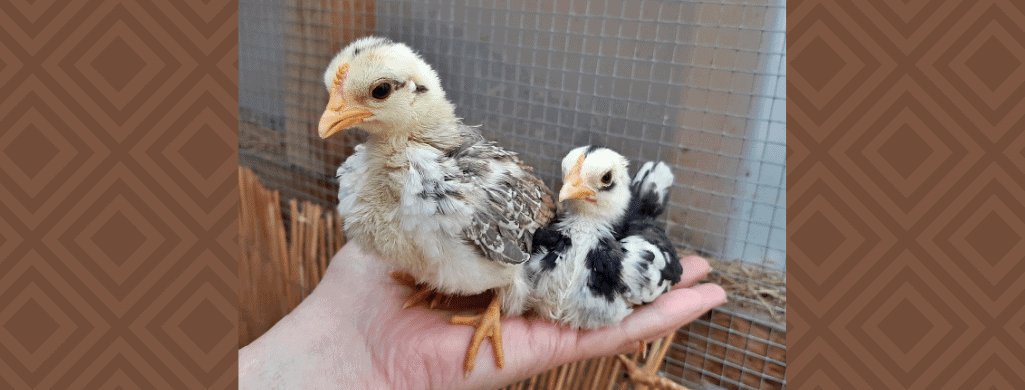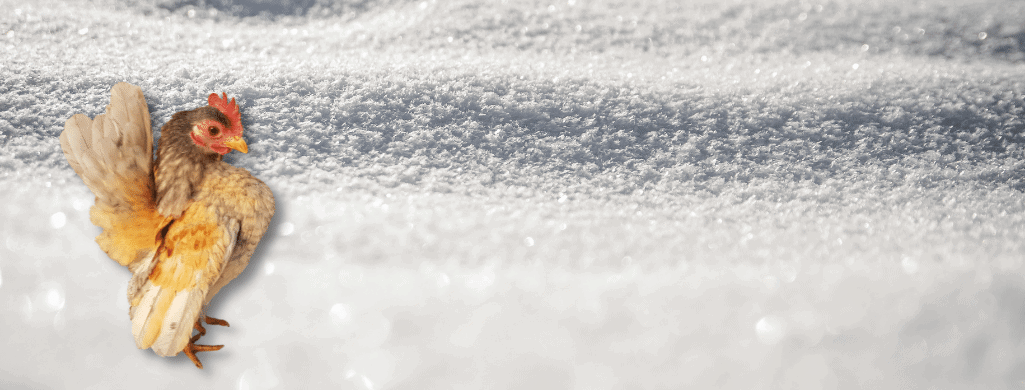Choosing breeds of chicken for cold climates takes some extra care.
After all, not every chicken will handle winter time as well as the last.
Which chickens thrive during those cold winter months? Are Serama chickens cold-hardy?
Serama chickens can handle temperatures as cold as 40° degrees Fahrenheit (4°C). Due to their small body mass, this chicken breed is susceptible to frigid temperatures. Chicks, in particular, struggle in colder climates or through harsh winters.
Let’s talk about how to keep these chickens safe in the rest of the article!

Table of Contents
ToggleWhat Is Too Cold for Serama Chickens?
Serama chickens thrive best in warmer temperatures.
While they can handle cold temperatures to an extent, anything below 40° degrees Fahrenheit (5° C) is too cold for comfort.
This rule is critical for baby chicks. While adult Serama chickens struggle in colder weather, a batch of chicks is in even more danger if unprotected during the winter.
Do Serama Chickens Still Lay Over the Winter?
You’ll likely see egg production from Serama chickens in the winter. However, production may decrease, especially if the winter is harsher than 40° degrees Fahrenheit (5° C).
However, it’s worth noting that Serama chickens aren’t often kept for egg production. Since this breed is so tiny, they lay smaller eggs than larger breeds of chickens.
So, they don’t offer as much production value.
Their size also means they aren’t well-suited for meat production either. Rather, Serama chickens often serve a more ornamental purpose.
How Do You Keep Serama Chickens Warm in the Winter?
Since Serama chickens aren’t very cold-hardy, taking the right precautions throughout the winter is important. There are a few wintertime precautions to choose from.
Keep an Indoor Aviary
Since a Serama chicken is so small and struggles with very low temperatures, many keep these birds in an indoor aviary.
Plus, their size makes them a popular pet or ornamental chicken rather than for egg or meat production.
Keeping these birds indoors is a great way to control their environment. It’s a way to keep them safe from cold weather and predators.
If you keep your birds indoors, make sure they have extra space. They need room to roam!

House Them as a Family of Chickens
Keeping chickens together in a coop is common practice for backyard chicken keepers and farmers.
This method may also help during colder weather.
As the temperature drops, they’ll huddle together for warmth. You may see this behavior among chickens at night.
It’s crucial to understand: this does not mean cramping your chickens together. While opinions can vary, the general consensus is chickens need 2-5’ feet of space in their coop.
This is if they’re free range.
Since a Serama chicken is so small in size, they’re often happy with 2’ square feet of nesting space.
Of course, make sure your Serama hens get along with other chickens by reading our article first.
Rid the Chicken Coop of Moisture
While your chickens want to drink fresh water, humidity in their coop won’t keep them warm. Since your chickens live in the coop, they create their own humidity.
It’s important to consider this even when humidity is low.
Humidity poses a risk because it traps moisture in a bird’s feathers. Just like if you were wearing wet clothes, it makes it a lot harder for the chicken to stay warm.
In addition, it increases the risk of frostbite.
It can freeze if moisture gathers on a Serama chicken’s comb or wattle. This is why the species is so susceptible to frostbite in the winter.
Let Them Roam During the Day
One way to avoid increased humidity is by not keeping chickens cooped up all the time.
During the day, when the temperatures are more tolerable, let your birds roam.
Clean Often
Chicken droppings also add to the humidity in the coop.
Coming out to pick up these droppings daily will go a long way to keeping moisture out of the air.
If it’s snowed, it’s also a good idea to clean any snow off the chicken coop. As it melts, it can introduce moisture to the coop.

Keep It Ventilated But Not Drafty
One of the best ways to reduce humidity in the coop is to increase ventilation. The goal of ventilation is to cycle air in and out of the coop.
This way, air doesn’t sit in the coop and become stale. This will also introduce new, fresh air into the coop.
Of course, you don’t want to go so far as to make the coop drafty. This will work against you and your birds!
Adding features such as ventilation windows is an excellent way to do this. To avoid drafts, position these higher than your chicken’s highest roosts.
Keep Up with Your Bird’s Health
A healthy bird is always the goal. Yet, a strong, healthy bird will also fare better in colder weather.
As winter approaches, keeping an extra eye on your chicken’s health will go a long way.
If they fall ill in the winter, it’s best to address the issue immediately!
Should You Turn to Heat Lamps?
When you’re cold, you might run to the thermostat and turn up the heat. So, it’s many people’s first thought when considering how to keep chickens warm in cold weather.
In truth, many advise against adding a new source of heat.
While it can serve its purpose in a sudden cold snap or freezing conditions, it often does more harm than good.
One concern is options like a heater or heat bulb often create a fire hazard.
Another concern is using added heat sources like this will make it harder for chickens to adapt to the lower temperatures.
With One Exception
This doesn’t mean any added heat source is negative.
For outdoor coops, a base heater is useful for the water source. This way, it doesn’t freeze, and your chickens stay hydrated!
How useful was this post?
Click on a star to rate it!
We are sorry that this post was not useful for you!
Let us improve this post!
Tell us how we can improve this post?
